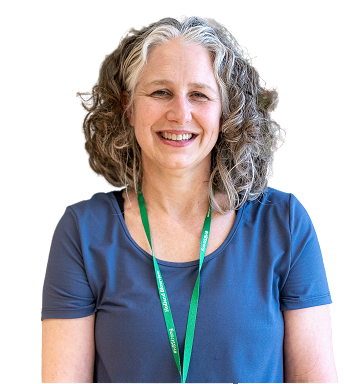Imagine a Workforce Where Disability is Embraced

Imagine a world where youth with disabilities are fully included in an accessible workforce.
The employment pathways team at Holland Bloorview is transforming that possibility into a reality.
As the project & strategy lead for the employment pathways program, Carolyn McDougall supports Holland Bloorview clients with achieving their dreams and getting early work experience. Through our youth employment programs, high school-aged youth with disabilities gain volunteer, co-op and seasonal paid work experience. They also receive life and employment skills coaching, self-discovery, employment planning activities and job search support—all within a personalized plan to meet their goals.
While supporting youth on their journeys is a key part of building a more inclusive and accessible workforce, anti-stigma education for employers is also essential. There has been an “an enormous interest in diversity and inclusion” over the past 15 years, Carolyn says, and Holland Bloorview saw an opportunity to build a more accessible workforce that is free from ableism.
Does ableism shape our society’s current workforce?
Carolyn: Definitely. Many job seekers encounter stigma in the form of myths about disability. It’s important to combat those myths through education and conversation. Employers may assume there may be costly accommodations, poor attendance or safety problems. Assumptions about what a person can or cannot do are also a big barrier. Instead of making assumptions, interviewers can ask all applicants a simple question: “What do you need to do your best at work?”
How does the Employment Pathways program combat those ableist assumptions?
Carolyn: We drive change by increasing awareness about how important employment is for all young people, including youth with disabilities. One way that we provide education and combat stigma is through our employer resource hub. Employers can learn about the business case for hiring young people with disabilities, how to build a more inclusive workforce and hear stories directly from youth and employers about their experiences.
Tell us about a time when an employer worked with Holland Bloorview to provide an accessible and inclusive experience for a youth with a disability. What were the outcomes?
Carolyn: A few years ago, a law firm was interested in working with us and hiring a youth with a disability. They wanted the youth and their staff to have a good experience. We worked with them to understand their work environment and hiring needs, and then we proposed young people who would be a good match. The youth they hired was an individual with a physical disability. There were things to figure out surrounding washroom access, how their desk would be set up and building access.
The law firm was a great partner. And in fact, their whole building said after the experience, “Wow. We made super important accessibility changes that benefit all our workers and people that come to the building. We had a great experience with a young person with a disability.” Everyone involved ended up with new information and a new sense of possibilities.
Do our employment programs help ensure we have an inclusive and diverse workforce at Holland Bloorview?
Carolyn: We hire young people every summer who are clients or past clients of our employment pathways programming. For example, we worked together with our people & culture team to support hiring a summer student who is neurodiverse. We provided advance disability confidence training for the team and coached the new employee and team in structuring the job tasks, training and communication.
Each summer we hire a past participant as a lived experience mentor for other youth in our employment pathways programs. And, our full-time youth facilitator runs all the life skills workshops in the summer as part of our early experience programming. A primary focus of his role is sharing his own lived experiences of being a young person with a disability, career planning and employment experiences.
What does an inclusive recruitment process and workforce look like? Why are they important?
Carolyn: Inclusive organizations understand that youth with disabilities often face barriers in the recruitment process due to ableism. For example, they may have gaps in experience opportunities. There may also be a lack of accommodations for differences in communication styles throughout the recruitment process. When an organization is inclusive, they take steps to advance equity in their hiring. Their teams are comfortable with—and in fact empowered by—including all learning and communication styles.
This supports youth with disabilities with bringing their strengths and talents to the workforce. Youth bring energy and other employees really enjoy mentoring younger workers. Youth with disabilities are an important part of healthy and engaged teams.
